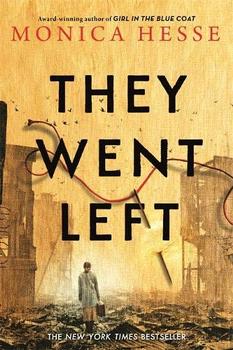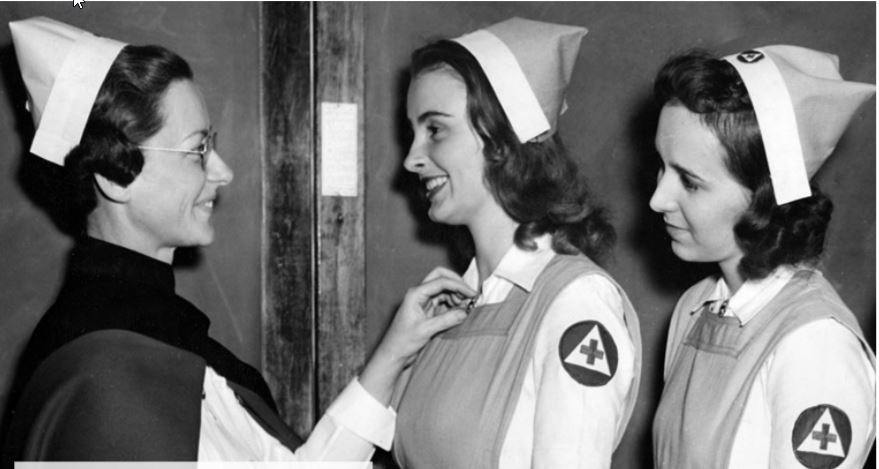Summary | Excerpt | Reading Guide | Reviews | Beyond the Book | Read-Alikes | Genres & Themes | Author Bio

Critics' Opinion:
Readers' Opinion:
First Published:
Apr 2020, 384 pages
Paperback:
Apr 2021, 384 pages
 Book Reviewed by:
Book Reviewed by:
Debbie Morrison
Buy This Book
This article relates to They Went Left
 The Red Cross is one of the aid organizations that plays a role in Monica Hesse's novel, They Went Left. Because so much of Europe was decimated after the war — phone service and many railways had been largely disrupted, for example — the Red Cross provided more than just medical care to Holocaust survivors, wounded soldiers and others affected by the war, it also served an important role in reconnecting family members. When we first meet Zofia, the protagonist of the novel, she is standing in a Red Cross line, waiting to give her brother's name so that a record of his "missing" status can be logged and the official search for him can begin.
The Red Cross is one of the aid organizations that plays a role in Monica Hesse's novel, They Went Left. Because so much of Europe was decimated after the war — phone service and many railways had been largely disrupted, for example — the Red Cross provided more than just medical care to Holocaust survivors, wounded soldiers and others affected by the war, it also served an important role in reconnecting family members. When we first meet Zofia, the protagonist of the novel, she is standing in a Red Cross line, waiting to give her brother's name so that a record of his "missing" status can be logged and the official search for him can begin.
Zofia displays an implied mistrust of the large bureaucracy's ability to find her brother faster than she can. What is equally interesting, however, is how such moments touch on the complicated reputation of the Red Cross during World War II.
To begin, from its founding in 1863, the Red Cross has not been a single entity but a conglomeration of individual organizations and "societies" that reside in many countries throughout the world. Each country's iteration of the Red Cross is regulated foremost by its home government's laws. Beyond that, each individual society also belongs to an international body called the Red Cross and Red Crescent. The organization states its primary goal as the following: "All Red Cross and Red Crescent activities have one central purpose: to help those who suffer, without discrimination, whether during conflict, in response to natural or man-made disasters, or due to conditions of chronic poverty."
The International Committee of the Red Cross (ICRC), the branch of the Red Cross and Red Crescent specifically charged with monitoring and protecting the victims of armed conflicts (in accordance with the Geneva Conventions) regardless of race or political affiliation, largely failed in its mission to protect Holocaust victims. In 1939, when the ICRC contacted the German Branch of the Red Cross, they were denied access to concentration camps where they sought to monitor conditions. Later, in 1942, as the ICRC continued to press the Germans for information and for a neutral, humanitarian presence in the camps, they were told that the German government would no longer speak of concentration camp detainees at all. There was widespread speculation that not only did the ICRC know exactly what was going on in the camps but that it had some contact with the United States government about how to remedy the situation. However, because the Red Cross was grounded in the Swiss philosophy of neutrality, it was unwilling to publicly confront German officials. It was further hesitant to put its other relief efforts in jeopardy over the issue of concentration camps, going so far as to suggest that the camps were more humane than they knew to be true.
Instead, the Red Cross tried alternative means of assisting the Holocaust victims and celebrated some comparatively small victories. In 1943, the Red Cross was able to begin sending food aid into concentration camps. While the food aid was not particularly successful in providing hunger relief, it was successful in beginning the extensive process of documenting the names of Holocaust victims. The Red Cross also aided in the removal and protection of thousands of Jewish children in Hungary and Romania, and initiated a widely successful prisoner of war (POW) relief program, shipping 27 million packages of food and medical supplies to POW camps.
After the war, and after the ICRC had received a Nobel Peace Price in 1944, the individual Red Cross societies from around the world set up broader relief camps throughout Europe. These camps not only formed a systematized medical, housing and food network, but also an extensive administrative network that allowed for the continued documentation of victims' names and other information, providing a detailed record of what had occurred during the war.
Red Cross nurses in 1941, courtesy of Red Cross
Filed under People, Eras & Events
![]() This "beyond the book article" relates to They Went Left. It originally ran in June 2020 and has been updated for the
April 2021 paperback edition.
Go to magazine.
This "beyond the book article" relates to They Went Left. It originally ran in June 2020 and has been updated for the
April 2021 paperback edition.
Go to magazine.





The Flower Sisters
by Michelle Collins Anderson
From the new Fannie Flagg of the Ozarks, a richly-woven story of family, forgiveness, and reinvention.

The House on Biscayne Bay
by Chanel Cleeton
As death stalks a gothic mansion in Miami, the lives of two women intertwine as the past and present collide.

The Funeral Cryer by Wenyan Lu
Debut novelist Wenyan Lu brings us this witty yet profound story about one woman's midlife reawakening in contemporary rural China.
Your guide toexceptional books
BookBrowse seeks out and recommends the best in contemporary fiction and nonfiction—books that not only engage and entertain but also deepen our understanding of ourselves and the world around us.